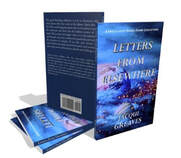
Universal Link: https://books2read.com/LettersFromElsewhere
For print version, search directly on your local Amazon or Barnes & Noble site.
Blurb
This genre-blending collection is rich in characters who aren’t always what they seem at first glance. Space pirates, Fire Elves and living grotesques take us on journeys across the multiverse and deep into the hidden crevices of the mind. These stories interrogate what it is to be monstrous; and along the way, they confront the patriarchy and explore the spectrum of sexuality. If you like your fantasy and science fiction a bit dark, laced with humour and sometimes spicy, these stories will entertain, disturb and challenge you.
“Jacqui Greaves titillates with this outstanding collection of speculative encounters, visits and ventures by otherworldly beings, each tale sharpening our understanding of the human condition and the tiny role we play in the universe. Cosmic, cautionary, and compelling, served up with a sprinkle of humour and a good dose of sauce, Letters from Elsewhere is a satisfyingly good read.” —Lee Murray, five-time Bram Stoker Award®-winning author of Grotesque: Monster Stories.
What inspired you to put together this collection?
I’ve been writing short stories for almost a decade now, so I’ve built up a large catalogue. Quite a few have already been published in various online magazines and anthologies, but over the years most of those publications have disappeared into the ether, leaving my stories orphaned. Others have just never found their place in the world.
Earlier this year, SpecFicNZ ran an online workshop on getting your short stories published. It got me thinking. When I went through my files, I realised I had a lot of orphaned and unpublished stories just sitting there doing nothing. So, ‘Letters From Elsewhere’ was born.
The collection covers a broad range of speculative fiction, including fantasy, science fiction, erotica and horror.
What on earth possessed you to mix your genres?
Honestly, I don’t set out to mix genres. I set out to ask “What if…”
Most of the stories in this collection are either fantasy or science fiction, with a few lying further afield on the spectrum of speculative fiction. A little under half incorporate explicit sex.
My genre blending is best demonstrated in the story ‘Moths to a Flame’, which has elves fucking in space – so fantasy, science fiction, erotica and a hint of historical fiction all twisted together in the space of a couple of thousand words.
I’m not afraid to include sex in my stories – after all it’s such a primal driver for humanity. I use the word erotica, because it’s a catch all, but I get frustrated when people interpret that to mean romance. The sex in my stories is not often of the romantic kind, it’s more about pleasure, and sometimes it’s weaponised. In ‘Flower Girl’ sex is used for pleasure, as a punishment, to celebrate and as a negotiation tool.
Does the collection have a theme?
For me the theme of the collection is ‘what it is to be monstrous.’
Are we born monstrous, or do we become monstrous? It’s not that simple. Our genes, our family, our experiences in the universe all feed into creating who we are. I believe we all have a monster lurking within. Whether that monster is unleashed on the world is a consequence of multitudes of small decisions and actions.
Several stories in this collection, e.g., ‘Persuasion’, ‘The Grotesque Wars’, ‘Please Sign the Waiver’, cause us to question who the real monster is. Often my tales are told from the perspective of someone we would consider a monster, e.g., ‘Starkiller’, ‘You are Already Dead’, ‘The Abyss’. I want my readers to sit in the monster’s skin and question their own monstrousness.
Most of your stories include strong female characters. Why?
I’m a feminist and a bisexual, so I naturally include strong female characters and queerness into my stories. I’m so tired of misogyny and the patriarchy – it’s just exhausting having to deal with them decade after decade. So, I write ‘What If’ stories where women rebel against expectations and oppressors get their comeuppance. Some of these stories, e.g., ‘Redundant’, have been influenced by real life.
You use humour to great effect. Why?
I once went to a book launch where someone else read out one of my stories. The audience were in hysterics. I was surprised because I hadn’t intended for it to be funny; it just was. That still happens, but I’m more aware of it now and use it consciously.
Some of these stories deal with big, serious issues, like death and the end of the world. By adding elements of humour, I think it makes it easier for the reader to handle these heavy subjects, while not slipping into a pit of despair.
 RSS Feed
RSS Feed